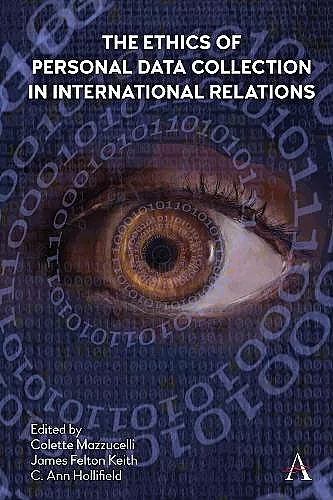The Ethics of Personal Data Collection in International Relations
Inclusionism in the Time of COVID-19
James Felton Keith editor C Ann Hollifield editor Colette Mazzucelli editor
Format:Hardback
Publisher:Anthem Press
Published:5th Apr '22
Should be back in stock very soon
This hardback is available in another edition too:
- Paperback£28.99(9781839988127)

Explains how the COVID-19 pandemic makes the omission of the ethics of personal data collection analysis in the international relations literature even more salient given the rise of contact tracing and increased uses of mobile phone Apps to track citizens by states and firms across the globe.
This volume’s relevance may be explained, first and foremost, during a time of unprecedented loss of life around the world each day. The data, which is oftentimes incomplete and misleading, nonetheless reveals the state as deficient as well as negligent in its response to social healthcare needs. This volume attests to the fact that pressing global public health concerns are ever present as subjects of societal discourse and debate in developed and developing states. Moreover, the COVID-19 pandemic makes the omission of the ethics of personal data collection analysis in the international relations literature even more salient given the rise of contact tracing and increased uses of mobile phone Apps to track citizens by states and firms across the globe, as this volume’s chapters analyzing the responses to COVID-19 in Iran and Taiwan explain.
"The Ethics of Personal Data Collection in International Relations is a timely contribution to a most urgent governance challenge of our time. The uses and misuses of data collection are amplified by the globalscale of public policy making in the era of COVID-19. As commercial and political interests assert their agendas, counter-veiling normative duties and restraints remain to be defined and empowered. Mazzucelli, Keith and Hollifield set a new agenda in this wide-ranging and thorough volume, particularly with their focus on the essential issue of inclusionism. This book is sure to guide the field of international relations in a fruitful new direction."– Joel H. Rosenthal, President, Carnegie Council for Ethics in International Affairs
“This volume represents a tremendously innovative, timely and cutting-edge treatment of one of the most compelling challenges of our day and age: the focus on personal data collection, including geopolitical and cultural contexts, especially during the COVID-19 pandemic. Taken as a whole, its content is very impressive both in scope and depth. Presenting primarily a non-Western perspective, the volume provides the reader with an important overview framing these challenges cogently and providing an international relations theory foundation that recognizes, synthesizes and amplifies newer approaches in our field. Such approaches bridge a gap between older international relations paradigms and newer concepts that recognize non-state actor as well as non-Western nation roles.” —Nanette Levinson, Co-Director, Internet Governance Lab, School of International Service, American University, USA
“Few scholarly collaborations can genuinely work at the intersection of IR and international and human rights law, with the ability to engage the IR literature so robustly. Few volumes can be so thoroughly creative theoretically and yet so grounded in field studies and cases, bringing the details of analysis and context to life. At its core, this volume practices what it preaches—the abject need to shift from a Eurocentric and state-centric default in IR inquiry into a holistic approach to inclusionism. Its content does this on an indisputably urgent topic—the fate of private data collection in a time of COVID-19, a period some fear is a dress rehearsal for increasing government intrusion into long standing human rights and freedoms via emergent technologies. Without the prima facie inclusion of such lenses as gender, geopolitics, culture, concern for nature and climate, and ethnic and religious pluralism into our standard IR theories, it is unlikely that scholars will be able to help decision makers come to the right policies for dealing with personal privacy.” —Corri Zoli, Director of Research, Institute for Security Policy & Law, Syracuse University College of Law / Maxwell School of Citizenship & Public Affairs
ISBN: 9781839981036
Dimensions: 229mm x 153mm x 26mm
Weight: 454g
244 pages